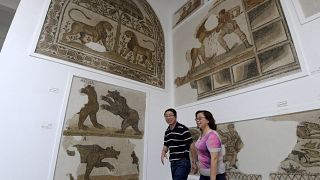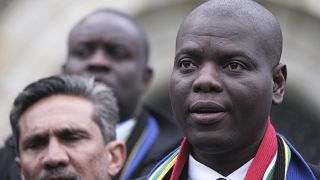Netherlands
In a Dutch museum the sound of hip-hop blares out next to sarcophagi and statues, in what curators say is an attempt to show the influence of ancient Egypt on black musicians.
A photo of superstar Beyoncé dressed as Queen Nefertiti sits next to ancient busts, while a video of Rihanna channels Egyptian styles.
What appears to be a pharaoh's golden mask turns out to be a modern sculpture based on the cover of an album by the rapper Nas.
But the "Kemet" exhibition at Leiden's Rijksmuseum van Oudheden (National Museum of Antiquities) has enraged Egypt, which has reportedly banned the museum's archaeologists from a dig at a key site.
Egypt's antiquities service said the museum is "falsifying history" with its "Afrocentric" approach, which seeks to appropriate Egyptian culture, Dutch media reported.
The museum said it had meanwhile been hit with comments on social media that were "racist or offensive in nature" after the row blew up in Egypt.
And so what was meant to be an empowering celebration of "Egypt in hip-hop, jazz, soul and funk" has instead become a culture war.
Assistant Professor University of Amsterdam, specialist in political geography with a regional focus on the Middle East and North Africa analyzes the reactions: " From what I can see it has been sort of viewed in a very particular light by the government back in Egypt."
"I think it's, it's important for us to, as you say to kind of move away from this more Eurocentric perspective through which Egypt's history has been viewed," Dr Ali Hamdan added.
The exhibition explores music by black artists including record album covers, photographs and contemporary artworks.
There are walls of album covers showing the influence of ancient Egypt on artists including Tina Turner, Earth Wind and Fire and Miles Davis, and a special interactive video installation.
Egyptian authorities denounce a desire to assimilate their historical heritage with US black culture.
"It's not only about kind of African Americans taking Egyptian culture, it's about a very wealthy commercial project that is to say Hollywood and other kind of related industries doing that," the Dr. says.
"So the perception is that there are these wealthy Hollywood elites who are kind of taking advantage of Egyptian culture and kind of rewriting how they view their own identity right. So there are a lot of layers to this I think that are worth keeping in mind."
The museums has insisted it aims to "show what scientific, Egyptological research can tell about ancient Egypt and Nubia." As it also aims to works are presented "to show and understand the depiction of ancient Egypt and the messages in music by black artists."
The curator of the exhibition, Daniel Soliman, is an egyptologist.
Much has been written about the controversy.
Museum director Wim Weijland was quoted by the Dutch newspaper NRC as saying that Egypt's reaction was "unseemly".
Daniel Voshart who works in art/film, visited the exhibition. He praised its "informative overview" and said the reaction to the exhibition was overblown.
"This doesn't make any sense to me and they're just sort of being too sensitive or trying to score political points maybe... Nothing to me was shocking," said the 37,-year-old from Canada.
"There were music videos that were already made and it's not like the Dutch government paid Beyoncé to become you know, Egyptian."
"There are paintings of Egyptians with dark, dark skin, curly hair, I mean it's if, if they're trying sort of to distinguish themselves from other parts of Africa, maybe a bit too much, but it was a blending of cultures, a blending of people. I don't think you know it's theft anyway."
"Complicated relationship"
The Kemet exhibition is named after an ancient name of Egypt meaning "the black land".
As it opened in late April it appeared to walk into a already-brewing in Egypt over a Netflix docudrama about Cleopatra.
The Rijksmuseum's musical showcase was subsequently hit by similar criticisms of rewriting history.
Egyptian authorities then banned the museum's archaeologists from the necropolis at Saqqara, south of Cairo, NRC said.
Staff at the museum were shocked as they have been active for nearly five decades at the vast burial site, a UNESCO World Heritage site, and are currently leading an excavation there.
"It's not just a story about whether the museum is getting the Egyptian identity right or wrong," Ali Hamdan, an assistant professor at the University of Amsterdam specialising in political geography, told AFP.
"This is a story about two different projects to make sense of Ancient Egypt. One is a... cultural project by this museum, and another is a political project by the Egyptian state."
Hamdan added that "your average Egyptian would describe themselves as Arab first maybe Egyptian second", while their relationship with Africa was "complicated".
Egyptian Tourism and Antquities authorities could not be reached for comment.













01:29
CAF Champions League: TP Mazembe “fully prepared to defend its chances” in semi-final game
01:57
Egyptian,Turkish Foreign ministers urge de-escalation in the Middle East
02:20
Beyoncé's 'Cowboy Carter' shines light on Black artists in country music
00:58
Egypt to receive € 1 billion loan from EU
02:37
Charity: More than 10 million Sudanese children have been in warzone
02:20
Heart surgeon turned comedian, Egypt's Bassem Youssef begins "The Middle Beast" tour